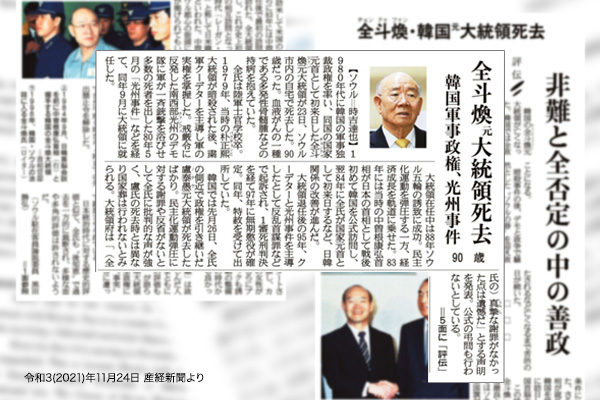Former South Korean President Chun Doo Hwan died at the age of 90. The incumbent Moon Jae In administration did not hold a state funeral for Chun or provide government support for a family funeral, defying a legal provision that a former president can be given a state funeral.
In his final days, Chun was plagued with financial difficulties and received monetary support from his friends even for his medical treatment. Costs for his funeral were reportedly shouldered by former cabinet ministers and secretaries of the Chun Doo Hwan administration.
President Moon or any other Blue House official failed to make a condolence visit to the Chun family. When North Korean dictator Kim Jong Il died, Moon asked the then South Korean government to dispatch an official delegation to Kim’s funeral and sent his courteous telegram of condolence to Pyongyang.
In his memoir published four years ago, Chun wrote that he would like to celebrate the unification of the Korean Peninsula while being skeletal remains on a frontal highland where the North is seen. This has effectively become his last word. But his cremains have not been allowed to be buried at a national cemetery or a frontal site. They will reportedly be laid out at his home for the time being.
Truth of Gwangju uprising
Not only the Moon Jae In administration, the leftist ruling party and leftist media but also opposition parties and rightist media criticize Chun for not apologizing to Gwangju uprising victims. Based on my six on-the-spot surveys two to four years after the uprising, however, I think that the demand for his apology is unreasonable.
The Gwangju uprising can be summarized as follows: In Gwangju alone, student demonstrators threw rocks at martial law troops in their violent resistance. Troops without shields or protection masks used sticks and bayonets to suppress violent demonstrators. Several student demonstrators died during the suppression. Malicious rumors spread, saying that soldiers from southeastern Gyeongsang Province came to wipe out southwestern Jeolla Province residents and that soldiers cut open the bellies of pregnant women. Excited demonstrators drove buses and trucks to crash into martial law troops, leaving some soldiers dead. Troops fired shots at their discretion for justifiable defense. Excited citizens held up an arsenal, became armed and exchanged fire with martial law troops. Those troops withdrew temporarily. But some radicals attacked a prison. In several days, most of excited citizens cooled down and returned weapons. Radicals held up in the South Jeolla government office and were squashed by martial law troops. A total of 163 demonstrators and 26 military and police officers died in the uprising.
Opposition presidential candidate failed to make a condolence visit
Chun was then security commander and another military officer served as martial law commander to take charge of suppressing the Gwangju uprising. Leftists still mistakenly claim that Chun issued an order to fire, and that Chun visited Gwangju. A malicious false report said that helicopters fired shots at demonstrators. Repeated government investigations confirmed that there was no such helicopter shooting. But President Moon ordered a reinvestigation while assuming such shooting, leading the Defense Ministry to give a report that there was such shooting. Chun was prosecuted for describing a priest who testified the helicopter shooting as a treacherous liar in his memoir. He was bought to the court despite his worsening dementia. He was effectively bullied under the name of justice.
Regrettably, conservative opposition presidential candidate Yoon Seok Youl had no courage to keep his promise to make a condolence visit to Chun’s family. This has become an additional reason for my confidence that even if the opposition candidate wins the presidential election, the rule of law would not be restored in South Korea.
Tsutomu Nishioka is a senior fellow and a Planning Committee member at the Japan Institute for National Fundamentals and a visiting professor at Reitaku University. He covers South and North Koreas.


